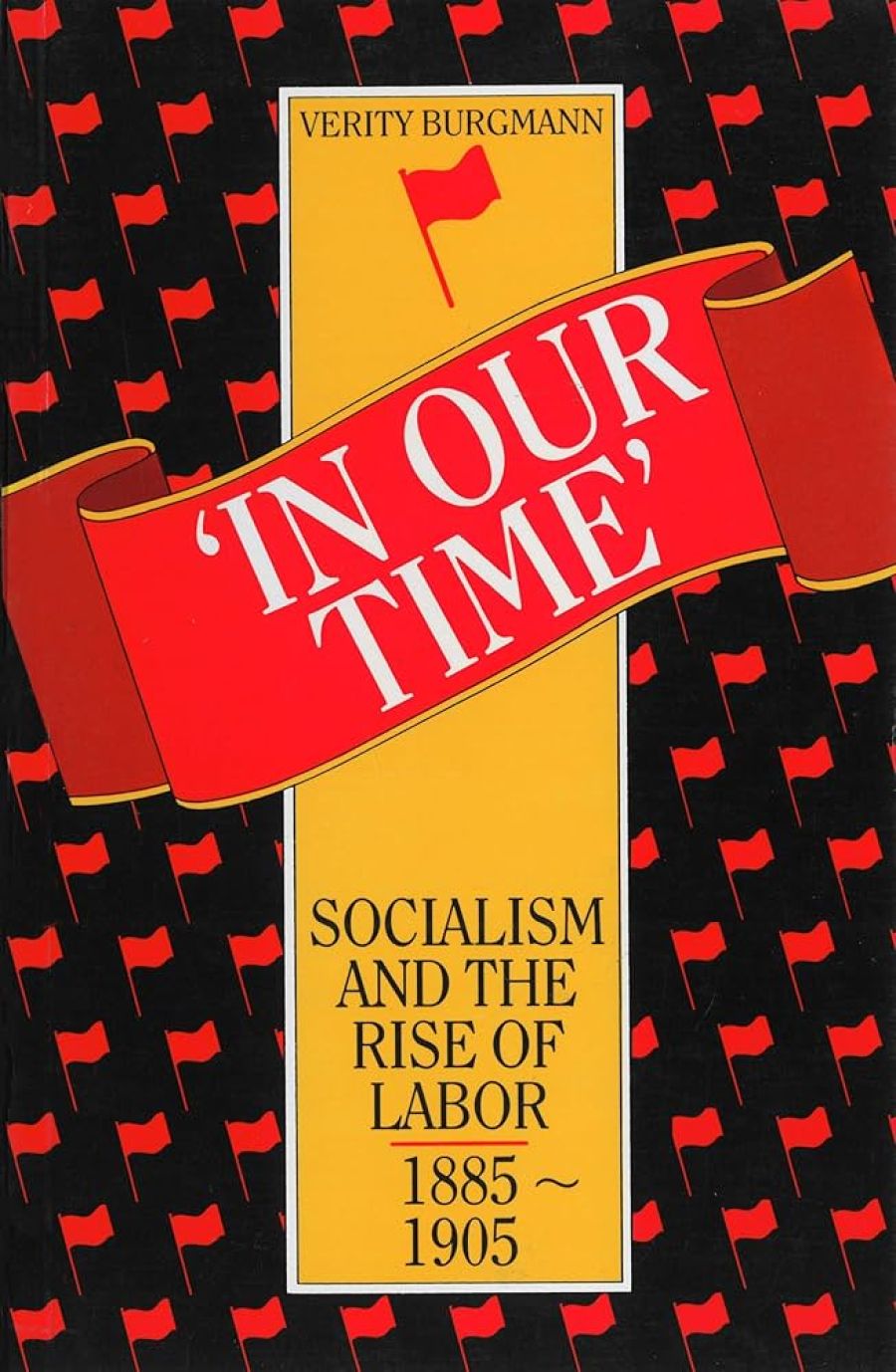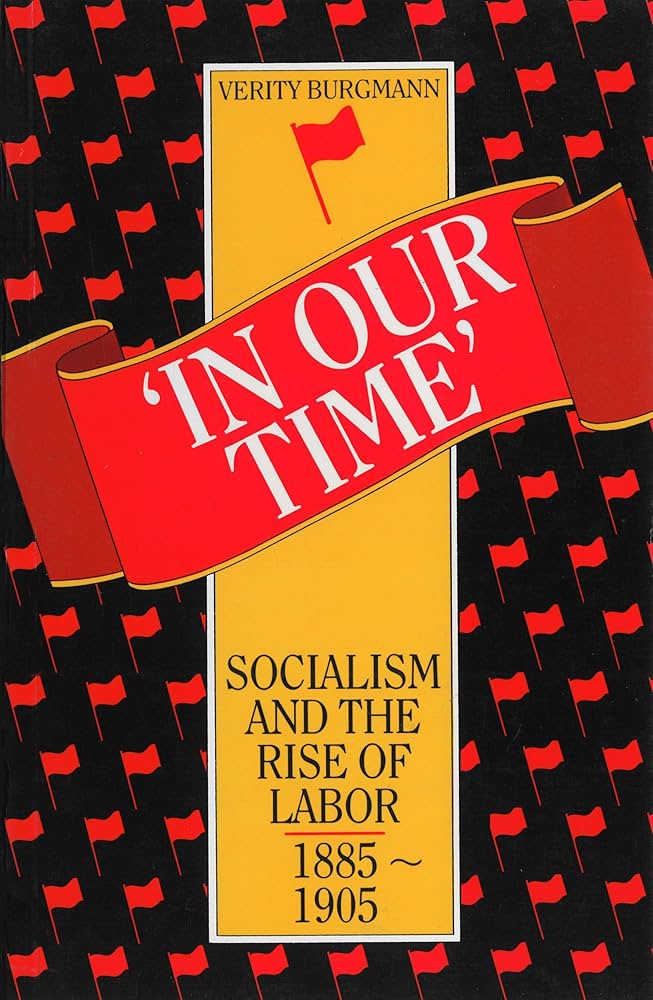
- Free Article: No
- Contents Category: History
- Review Article: Yes
- Article Title: Socialism in Our Time: And the Labor Party is born
- Online Only: No
- Custom Highlight Text:
Although this book is written of a period in Australian history beginning exactly one century ago, a verse from a poem written in the 1890’s which Burgmann quotes on the last page of her book has poignancy for labor idealists today:
No wonder that the people turn, they are so oft betrayed
By men of mighty promises whom danger makes afraid.
O what’s the use of choosing chiefs to smash the Evil down,
If when they get into the van they end by ‘backing down’Yet this is not a tale of betrayal and woe. It is the story of men and a few women who were in the vanguard of organised labor as it became politically influential; frustrated and frequently exhausted they may have been, and not a few succumbed to the ease of parliamentary privilege, but in this chronicle of their activities it is remarkable how rarely the canker of cynicism appears.
- Book 1 Title: In Our Time
- Book 1 Subtitle: Socialism and the rise of Labor 1885 – 1905
- Book 1 Biblio: Allen & Unwin, 240p., $19.95, $9.95 pb
- Book 1 Cover Small (400 x 600):

- Book 1 Cover (800 x 1200):

Yet this is not a tale of betrayal and woe. It is the story of men and a few women who were in the vanguard of organised labor as it became politically influential; frustrated and frequently exhausted they may have been, and not a few succumbed to the ease of parliamentary privilege, but in this chronicle of their activities it is remarkable how rarely the canker of cynicism appears.
Verity Burgmann has filled a gap. That’s what historians are always supposed to do and one would think that in the field of labor history - the ground which has been most extensively mined in Australian historical research - such an important subject would not have been overlooked for so long. Burgmann suggests in her introduction that the reason lies in the assumption of mainstream historians that ‘the achievements of an institution in its maturity were the aspirations of those who founded the institution in the first place’. In other words, history tends to be about what has survived, about the forces that have been victorious rather than about men and women who fought and lost. Thus we have been denied what Burgmann calls a sense ‘historical disappointment’.
This revision of the record does more than simply resurrect a few agitators. and their comparatively poorly supported radical organisations; In Our Time is placed in the context of widespread receptivity to progressive thinking at the turn of the century and to the ferment of ideas for making the world anew that was the chief characteristic of Western thought in the decades before the Great War. This accounts for the prevalent optimism and sense of urgency informing activities as far apart as William Lane’s ‘New Australia’ and Tom Mann’s rural forays organising for the fledgeling Victorian Labor Party. Common to all the agitators was a belief in the imminence of a new order; they all believed that socialism would be achieved ‘in our time’.
There are three major themes to Burgmann’s interpretation of the relationship between socialist agitation and the rise of labor in Australia: first socialist ideas were of much greater significance in these earlier years than has heretofore been acknowledged; second, the debates and discussions among Australian socialists were heavily dependent on the large amount of English, European and American literature imported and on the ideas of overseas socialist visitors to the Antipodes; and, third, there was an enormous array of socialist ideas and solutions which resulted not only in frequent schisms but also in distinctive brands of socialism being adopted in the different colonies and states.
It was the Frenchman, Albert Metin, who made the trite and, until now, unquestioned observation that the Australian labor movement was socialism ‘sans doctrines’. In describing only the first twenty years of socialist activity in this country, Burgmann demonstrates that familiarity with the work of Marx and Engels as with the writings of, among others, William Morris, Edward Bellamy, Henry George, Kropotkin, H. G. Wells, and the tracts of English and American socialist groups was evident among both intellectual reformers and working class radicals who spent many nights in study groups grappling earnestly with complicated ideas and difficult expression. Like their counterparts in the northern hemisphere, they argued about the merits and demerits of state socialism, anarchism, libertarianism, cooperativism and utopianism and much of this debate surfaced in the larger labor movements in the form of objectives and strategies adopted. The ideas were certainly derivative and there was some obvious adulation of the ‘The Visitor’ - a ‘socialist cringe’ toward the likes of Ben Tillett and Tom Mann - but early Australian socialists were certainly not uncritical and nor, Burgmann convincingly argues, was their socialism untheoretical.
Undoubtedly, the most valuable aspect of In Our Time is its detailed comparative analysis of the whole period colony by colony, an examination related carefully to the varied founding assumptions of each and their strong cultural disparities. Each eventual state adopted a distinctive prevailing socialist style. Appropriately, Burgmann begins by describing William Lane’s doomed experiment with establishing an entirely new colony which would have no corrupting traditions to suppress. Its inclusion is necessary here but the material it contains is not as new as that in the following chapters. Among the socialists who stayed at home, lesser settlement schemes were tried and invariably also failed; those attempted in South Australia were the most important in terms of significance attached to them by the wider socialist and labor movements. Burgmann explains how this Georgian emphasis arose from the Wakefield plan of colonisation which stipulated high prices for land and thus created a class of have-nots whose resentment focussed not on more conventional dissatisfaction with working conditions but on their landlessness.
In N.S.W. - a more complex society - strong libertarian and ‘modern’ socialist ideas flourished alongside state socialism whereas, in Queensland, the dominance of state and municipal socialist schemes was never in doubt given the early success of labour in politics and the identification of socialists with Labor government. In Tasmania, the convict legacy and the comparatively recent cessation of transportation had delayed the emergence of a strong working-class movement and resulted, during this early period of Australian socialist development, in heavy handed suppression of the few progressive voices by an electorally dominant Anglophile establishment. Western Australia was the frontier state and socialism there developed with union consciousness among miners and the fight for legalisation of industrial organisation achieved finally in 1902. State socialism was clearly preferred by the Westralians to utopian schemes and the more abstract ideas of N.S.W.’s city sophisticates. As in Victoria, socialism in the West experienced its first efflorescence in the early years of the twentieth century when N.S.W. and Queensland socialism was in decline.
In Victoria, late development was the product of opposite influences. Early industrialisation had resulted in dominance of the organised labor movement by craft unions and alliance with the manufacturing and liberal influences against commercial and pastoral hegemony. It took a good deal of work, considerable working class suffering in the 1890’s depression and the feel of direct state repression and liberal betrayal during the 1903 railway strike, to get a Labor party launched effectively. In this, socialists - mostly adherents of state socialism with more than a tinge of cooperativism - were crucial and were to remain so in the decades following when Victorian labor acquired its reputation of radical leadership. It is significant in Victoria’s story that Burgmann ends her book in 1905, the year the Victorian Socialist Party - arguably the most successful of all the socialist ginger groups in Australia’s history - was founded.
I can find little to complain about in this book except a quibble with style. Burgmann writes readably and clearly enough without having to resort to anachronistic expressions such as ‘smart arse foreigner’ (describing Metiri) or ‘nutty as a fruit cake’ (in reference to William Lane). I could also ask for more detailed placing of the socialist agitators in context of an intellectual milieu but it would make the book unreasonably long. One can’t help feeling some confusion in the face of the plethora of socialist organisations but that is hardly Burgmann’s fault and she types them and relates them to each other very clearly.
The succeeding twenty years of socialist ferment in Australia were perhaps even more significant and; to my mind, more exciting, than the period here examined; let’s hope Verity Burgmann will soon produce a similarly incisive analysis of 1905-25 as a second instalment of this history of Australian socialism.


Comments powered by CComment